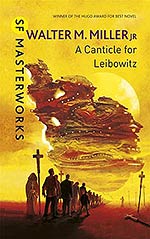
![]() woodmr
woodmr
2/5/2015
![]()
In reality I'd classify this book as three novelas bound together by a central thread of continuity. The first third of the book takes place just after a major catastrophe has plunged humanity back into a medieval setting, the second third several hundred years later during a second Renaissance, and the last third even farther into the future during a new modern age on the brink of annihilating itself. Throughout each era an order of monks venerate the memory of a new martyr, later saint, Leibowitz, and continue his work of preserving the world's knowledge while fighting the ever present darkness from without and within.
The sparse writing style, shifting view points, and philosophical discussions don't make for an easy read; I had a hard time cracking the first few chapters before I settled into the author's rhythm. There are no action scenes, romantic subplots, or quirky comics to lighten the mood. The post-nuclear war setting doesn't shy away from the brutality such a world might produce. But if you ever wished the characters of Asimov or Bradbury had discussed spiritual matters with the same verve as scientific discovery, this book is one for you.
Real human longings are expressed in the shared logos of science and theology, while the need for a deeper Truth beyond mere facts is shown time and again. The earliest monks are focused more on survival than anything else, cut off from the very civilization they seek to preserve. Later the order is sought by a world newly awakened to a hunger for knowledge and yet growing no wiser from its gathering, a reoccurring theme.
Yet my favorite character's struggles occurred in the final, bleakest section. Just as this era is a culmination of all that came before, the Abbot Zerchi is a hodge podge of so many competing ideas: reverent and impatient, impulsive and contemplative, a man just as apt to tinker with his computer as he is to fight against evil, sometimes with more gusto than foresight. He's a bit like St. Peter himself in that respect, but also a representation of St. Paul's lament on doing that which he does not wish to do, even as his age rushes to an apocalypse no one claims to want. His duty in the hardest of all, "to wait for the end and pray that it would not come." He provides bold leadership to his flock as the world around them collapses, balancing mercy and justice in the hardest of decisions, facing his own garden of Gethsemane with real agony and a glimpse of the divine.
I don't know what the author's personal beliefs are, and no doubt some may find it odd that a dark, distopian tale could also inspire hope. If in fact this life is all we have, the book would be a sad reflection on the futility of existence (a conclusion reached by so many science fiction authors). But if, as so many of the characters believe, there is a Truth beyond what we can see and grace beyond our understanding, this book points to a way through the gloom. Providence works throughout each period of time, leading people beyond the point of mere human endurance, some failing, some holding onto hope, all working toward a promised future which will not be destroyed despite the depravity of man.
http://www.woodmr.net/blog/canticle-leibowitz-transcendent-distopia